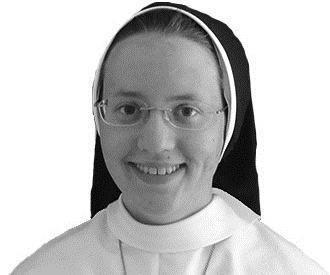 A statue of Mary is seen at Old St. Mary's Catholic Church in the Greektown neighborhood of Detroit in this 2015 file photo. The Detroit Archdiocese is celebrating the new feast day for Mary, Mother of the Church with a May 21 Mass at Old St. Mary's followed by a May Crowning and procession. Archdiocese of Detroit
A statue of Mary is seen at Old St. Mary's Catholic Church in the Greektown neighborhood of Detroit in this 2015 file photo. The Detroit Archdiocese is celebrating the new feast day for Mary, Mother of the Church with a May 21 Mass at Old St. Mary's followed by a May Crowning and procession. Archdiocese of Detroit“Almighty God … had to choose his Mother. What would you have done, if you had had to choose yours? I think that you and I would have chosen the mother we have, filling her with all graces. That is what God did.”
St. Josemaría Escrivà always spoke so beautifully of Mary. He would have been overjoyed at the new feast Pope Francis has instituted for the Monday after Pentecost: Mary, Mother of the Church.
Our mothers, in large part, make us who we are. Jesus would have shared His Mother’s mannerisms, done things the way she taught Him — just as my mother comes to mind whenever I write a thank you note or dive for a coaster to protect a wooden surface from a cold beverage. Our mothers perceive both our natural gifts and our weaknesses and strive to enhance the former and strengthen the latter; God does the same through grace, making us mothers and fathers in the spiritual order.
How does this work? Look to Our Lady at Pentecost, gathered with the disciples, awaiting Christ’s promise of the Spirit. She exemplifies spiritual motherhood through prayer, pardon and proclamation. From the first moment we meet Mary in the Gospels, we know her as a woman of prayer, pondering divine things in her heart. Here, at Pentecost, she is again praying — praying for this timid nascent Church. As if in answer to her call, her Spouse, the Spirit, comes in force, with overflowing exuberance and the gifts of courage and tongues. We, too, must be people of prayer: the Spirit waits to fill us, and others, at our request, with the same fire of charity.
That fire burns bright in acts of pardon. We should be astounded by Mary surrounded by the Twelve at Pentecost, almost as much as by Christ’s, “Father, forgive them, for they know not what they do.” The Apostles with whom Mary was praying that morning had denied acquaintance with Her Son in His hour of need and had left her alone beside Him in His agony. And yet, when they must have come to her, broken-hearted, she received them, probably without reproach, knowing that their own remorse was penalty enough. Forgiveness is a sign of contradiction, teaching others the beauty and freedom of a life lived with God.
And finally, proclamation. Mary does not simply pray and pardon; she shares what she knows with the Apostles. Imagine her, after Her Son’s Ascension, rallying these men who likely missed their Master very much. “Come,” she says, “let us spend time with Him who is no longer physically present to us but is certainly still close. I will teach you how to pray.” We, too, should offer others the opportunity to pray, inviting them to Mass, teaching them the Rosary, spending a few moments with them in church. Thus we will be mothers and fathers after the likeness of our noble Mother.
Sr. Maria Veritas Marks is a member of the Ann Arbor-based Dominican Sisters of Mary, Mother of the Eucharist.










